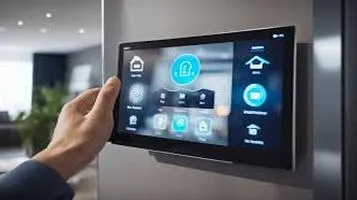Smart Home Assistants - Revolutionizing Modern Living
Smart Home Assistants are advanced digital tools designed to streamline and enhance the modern living experience through automation and voice command technology. These devices, powered by artificial intelligence, integrate with a variety of smart home devices, allowing users to control lighting, climate, entertainment systems, and security features with simple voice commands or through mobile apps. Popular platforms like Amazon Alexa, Google Assistant, and Apple HomeKit offer seamless connectivity with thousands of compatible devices, enhancing convenience and efficiency. Smart Home Assistants can schedule tasks, provide reminders, deliver real-time information, and learn user preferences over time to offer a personalized experience. As they continue to evolve, these assistants are becoming central to the ecosystem of connected homes, offering increased comfort, security, and energy efficiency.

In an era where technology is seamlessly woven into the fabric of our daily lives, smart home assistants have emerged as one of the most transformative innovations. These devices, powered by advanced artificial intelligence (AI) and machine learning algorithms, have redefined the way we interact with our homes. From managing mundane tasks to providing entertainment and security, smart home assistants such as Amazon Echo, Google Home, and Apple HomePod have become indispensable to many households. This review delves into the myriad features, benefits, and potential drawbacks of smart home assistants, offering a comprehensive insight into their role in modern living.
Functionality and Features
Smart home assistants are designed to be the central hub of a connected home. They operate on voice commands, making them incredibly user-friendly. With natural language processing capabilities, these assistants can understand and respond to a wide array of requests. Whether it’s playing music, setting reminders, controlling smart home devices, or answering questions, the functionality of these assistants is vast.
Voice-Controlled Convenience: At the heart of smart home assistants is the convenience of voice control. Hands-free operation is a game-changer, especially when multitasking. For instance, while cooking, one can ask the assistant for a recipe or to set a timer without touching any device. Similarly, voice commands can be used to control lights, thermostats, and even security systems, making home management seamless.
Integration with Smart Devices: The ability to integrate with a plethora of smart home devices is another significant advantage. From smart bulbs and thermostats to security cameras and door locks, these assistants can control a wide range of devices, creating a cohesive and automated home environment. This integration is facilitated through platforms like Amazon’s Alexa, Google Assistant, and Apple’s Siri, which support numerous third-party devices.
Entertainment and Information: Smart home assistants are also excellent sources of entertainment and information. They can stream music from various services, play podcasts, audiobooks, and even radio stations. Moreover, they can provide real-time updates on weather, news, and traffic, ensuring users are always informed.
Benefits of Smart Home Assistants
Enhanced Convenience: The most obvious benefit is the enhanced convenience they bring to daily life. Simple voice commands can perform complex tasks, saving time and effort. This is particularly beneficial for individuals with mobility issues or those who are constantly on the go.
Energy Efficiency: Smart home assistants contribute to energy efficiency by optimizing the use of smart devices. For example, they can adjust thermostats based on occupancy, turn off lights when not in use, and provide insights into energy consumption patterns. This not only reduces energy bills but also promotes a sustainable lifestyle.
Improved Security: Security is a critical aspect of modern living, and smart home assistants play a pivotal role here. Integrated with smart security systems, they can monitor homes, send alerts in case of suspicious activities, and even allow remote access to security feeds. Features like voice recognition add an extra layer of security, ensuring that only authorized users can control the system.
Personalization: AI and machine learning enable smart home assistants to learn user preferences over time. This personalization results in more accurate responses and tailored recommendations. For instance, they can suggest music based on listening history, provide reminders for routine tasks, and even adjust lighting and temperature settings to suit individual preferences.
Potential Drawbacks
Despite their numerous advantages, smart home assistants are not without potential drawbacks. Privacy and security are major concerns. These devices are always listening for their wake words, which means they can potentially record conversations inadvertently. While companies assure that data is encrypted and privacy measures are in place, the risk of data breaches cannot be entirely ruled out.
Dependence on Internet Connectivity: Another limitation is their dependence on internet connectivity. Without a stable internet connection, the functionality of smart home assistants is significantly reduced. This can be a problem in areas with unreliable internet service.
Interoperability Issues: Although smart home assistants support a wide range of devices, there can be interoperability issues. Not all devices are compatible with every assistant, which can limit functionality. This fragmentation can be frustrating for users trying to create a seamless smart home ecosystem.
Conclusion
Smart home assistants are undeniably a remarkable innovation that has revolutionized modern living. Their ability to perform a multitude of tasks through simple voice commands makes them indispensable in today’s fast-paced world. From enhancing convenience and energy efficiency to improving security and personalization, the benefits are substantial. However, it is crucial to be mindful of potential privacy concerns and ensure robust security measures are in place.
As technology continues to evolve, smart home assistants are likely to become even more integrated into our daily lives, offering new features and improved interoperability. For now, they remain a testament to how far technology has come in making our homes smarter, more efficient, and ultimately, more comfortable.






